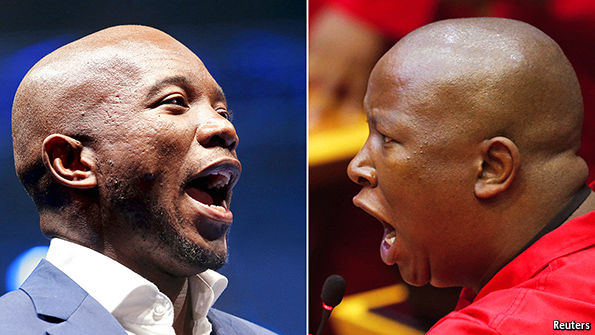Young rivals
 Will Maimane (left) or Malema hurt the ANC more?
Will Maimane (left) or Malema hurt the ANC more?FORGET ducking and dodging corruption charges. Jacob Zuma’s new signature move is the “dab”. At rallies ahead of local government elections on August 3rd, South Africa’s 74-year-old president drops his forehead to the crook of one arm and bops—a dance move borrowed from American hip-hop culture. These elections will be a crucial test of support for the African National Congress (ANC) under the unpopular Mr Zuma.
He is facing two much younger rivals seeking to knock the ruling party off its post-liberation perch. The ANC, in an attempt to update its image among young voters, has adopted “dabbing” for its campaign events, along with pop star endorsements and branded leather jackets. For South Africa’s two biggest opposition parties, this election offers their best shot yet of denting the ANC’s dominance.
Mr Zuma’s rivals hail from different political planets. Mmusi Maimane, just 36 years old, leads the Democratic Alliance (DA), a liberal-leaning party that drew 22% of the vote in the 2014 general elections. For Mr Maimane, the first black leader of what many still regard as a white-dominated party, this is a make or break election. The DA, with a record of clean governance, is desperate to win a big city outside its Western Cape base. Nelson Mandela Bay metro, which includes the city of Port Elizabeth, is the party’s likeliest target; taking Johannesburg or Tshwane (Pretoria) would be a triumph. Although Mr Maimane, who until recently doubled as a preacher, is known for giving impassioned speeches—notably, an address in parliament damning Mr Zuma as a “broken man”—he has faced an uphill battle in trying to sway a mostly black electorate.
On the political left is the bombastic Julius Malema, 35, “commander-in-chief” of his radical Economic Freedom Fighters. The EFF was formed after Mr Malema, a former youth league leader in the ANC, fell out with Mr Zuma and was booted out of the party. Now only three years old, the EFF has shaken up South African politics with revolutionary rhetoric and attention-grabbing moves such as wearing workers’ costumes to parliament—overalls, maids’ uniforms—topped with Che Guevara-style red berets (these have become a must-have accessory for youth on the march). The party’s new smartphone app includes EFF-themed playlists and push notifications for Mr Malema’s latest missives.
Mr Malema, who once said he would “kill for Zuma”, now accuses the president of being a dictator. He courts angry young voters who chafe at the scarcity of jobs and flagrancy of corruption under the ANC. He is also a skilled demagogue, making inflammatory remarks that often have a racial overtone. Some have compared him to Idi Amin, which is rather unfair as Mr Malema is not a mass murderer.
The big question is whether disgruntled ANC supporters will stay loyal, stay home or cast a ballot for an alternative. Weekly polls commissioned from Ipsos by eNCA, a private broadcaster, have the DA leading the ANC in all three battleground metro areas. The DA’s own polling is less optimistic. The EFF, which aims to triple its support from the 6% received in the 2014 general elections (10-12% is thought a more likely number), has focused on Mr Malema’s home province of Limpopo, as well as KwaZulu-Natal, where the ANC has been racked by violent internal disputes.
Sensing danger, Mr Zuma has gone on the attack, dancing his way past his legal problems and using crude insults to distract his audiences. During a recent campaign event he called the DA a “poisonous snake” and accused the party of being anti-black. He said that Mr Malema and the EFF party leaders were “small boys who have no respect”. “Voting ANC is like opening [the] gates to heaven,” Mr Zuma warned a cheering crowd at a rally in the Eastern Cape. “If you do not vote ANC, it’s like choosing to be with [the] devil.”
http://www.economist.com/news/middle-east-and-africa/21702761-can-energised-opposition-two-fresh-leaders-poach-anc-voters-young?fsrc=scn/tw/te/pe/ed/youngrivals

